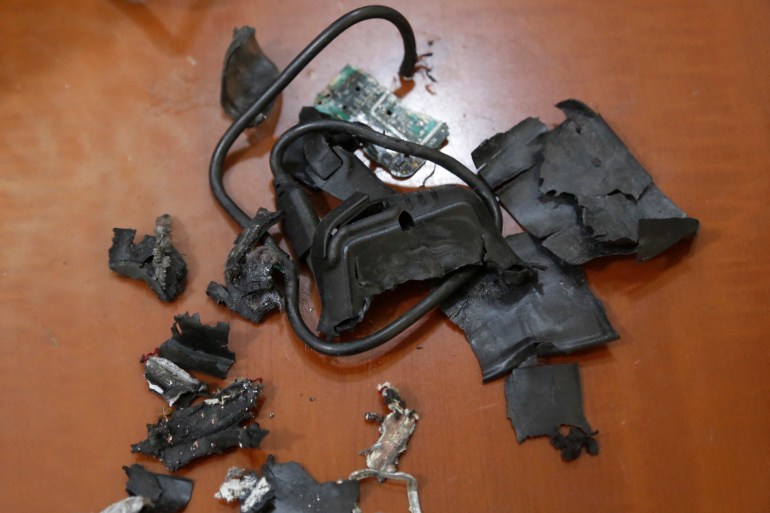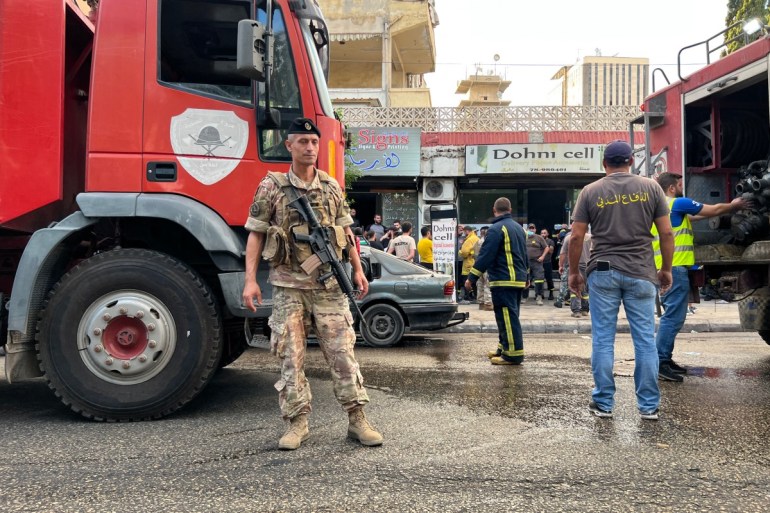As the people of Lebanon come to terms with the attacks on communication devices that killed and maimed many, the Israeli public seems divided between elation over the attacks and nervousness over potential repercussions.
In a region where nerves are at breaking point as Israel’s war on Gaza approaches a year, this escalation is the latest in a series of concerning developments.
In addition to killing at least 41,000 people in its war on a blockaded enclave, Israel has traded threatening repartee with Iran, bombed Yemen in retaliation for a Houthi drone attack, and traded fire near-constantly with Hezbollah throughout.
Celebration
On Tuesday and Wednesday afternoon, thousands of communication devices belonging to Hezbollah exploded in what appeared to be a series of coordinated detonations across Lebanon and Syria.
At the time of writing, 32 people have been killed, including two children, and thousands injured, many maimed or permanently disfigured, as a result of the attacks.
The stakes are lost on few within Israel, sources said, where elation over the novelty and ingenuity of the attacks freely mixes with concern over their consequences.
Few regard the threat posed to Israel by Hezbollah to have been significantly reduced by the attacks.
Israel has been massing troops to the north – ostensibly in a bid to allow the return of 60,000 residents evacuated from there amidst the tit-for-tat attacks between Hezbollah and Israel.
“These were daring attacks,” Mitchell Barak, a pollster and former aide to senior Israeli political figures, said from Jerusalem.
“If they were carried out by Israel,” he said – referencing Israel’s tendency to not comment on such attacks – “they’ve reinforced our reputation as ‘start-up nation’, innovative, daring and imagination.”
Barak stressed that both the unique nature of the attack and the level of infiltration required to carry it out had embarrassed Hezbollah.
“This was big,” he said. “Bigger than anything we’ve seen throughout the war. Possibly even bigger than the preemptive strike on the Egyptian air force in 1967 [which started a war].”

“No place is safe for them now. They’re going to want to respond to that, but they may find out that a US-brokered ceasefire is their best bet, because who knows what surprise could be next,” he said, hinting more Israeli attacks may be to come.
Poking bears
While media reports suggest that the precise timing of the attack may not have been of Israel’s choosing, the detonations nevertheless appear to have occurred at a fortuitous moment for it.
On Wednesday, the Israeli military redeployed its 98th Paratroopers Division from Gaza to the border with Lebanon, augmenting the Northern Command, which, until 2000, had occupied parts of Lebanon.
Later that day, Prime Minister Benjamin Netanyahu, Defence Minister Yoav Gallant, Israeli military chief Herzi Halevi and others issued statements suggesting that a war with Hezbollah may be inevitable.
“It’s not clear what’s going to happen,” Israeli analyst Nimrod Flashenberg said.
“On the one hand, among the public, many people are still giddy from the movie-style nature of the attacks on Hezbollah, so there isn’t any great craving for war.
“On the other hand, this is Hezbollah. This is the Big Bad. The call to strike and strike while they’re weak – particularly among the right – is hard to avoid.”
Brinksmanship
To many, including many within Hezbollah itself, war appears almost inevitable.
Across the region, analysts talk of the need for Hezbollah to retaliate against the strikes.
However, despite maintaining a mostly steady exchange of fire with Israel during the course of the war on Gaza, Hezbollah’s leadership in Lebanon and allies in Iran have gone to pains to avoid escalating the conflict.
“Right now, there’s the most expensive game of chicken in the world taking place across the region,” political analyst Ori Goldberg said from Tel Aviv.
“Netanyahu would welcome a war, but he cannot let anyone think he started it,” he said.
“It’s always framed as a kind of inevitability; one that the Israeli leadership can’t be held responsible for.
“They’re creating their own self-fulfilling prophecy.
“There’s no strategy, no vision, nothing. They’re just working it out day by day and assuming war will follow,” Goldberg added.
Division
For now, the explosions in Lebanon have not changed anything in the Israeli parliament’s discourse, said Ofer Cassif, a member of parliament in Israel, representing the left-wing Hadash coalition.

Little can be expected from parliament, which is paralysed between the extreme right and their opponents on the left.
“Politics and society in Israel are polarised,” Cassif said, explaining that the attacks in Lebanon were unlikely to change many opinions.
“There are those on the right – let’s call them what they are, fascists – who want a bloodbath, conquest and occupation.
“Opposing them are different forces who have been against the massacre in Gaza, calling for its ending and the release of the hostages. Between these two forces, the centre, as it were, vanishes,” he said.
“I don’t think these terrorist attacks will change anything,” he added, explaining that he was using that term for the detonations in Lebanon as he would any explosion in a public space.
“It’s very strange how they see the attacks here. People talk about the attacks in terms of Hezbollah’s command structure and the implications of this or that.
“Nobody in Israel seems to talk about the terror inflicted upon the people of Lebanon. I mean, can you imagine it?” Goldberg said in Tel Aviv.
“Some will see them as too little, too late, and those on the left, like me, will continue our struggle against the danger of yet another war that will only bring more destruction, death and agony to the region,” Cassif said.
“We’re where we started off, polarised.”





